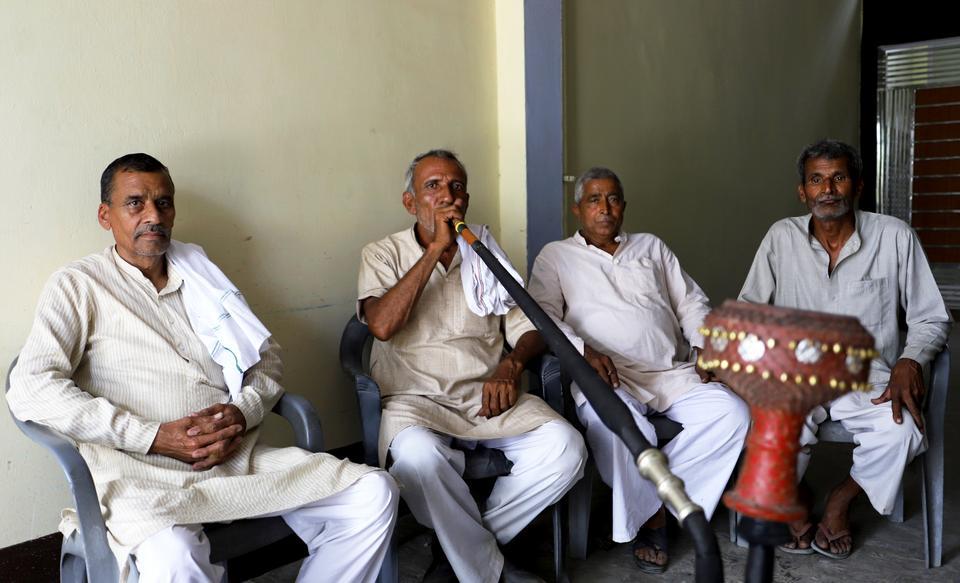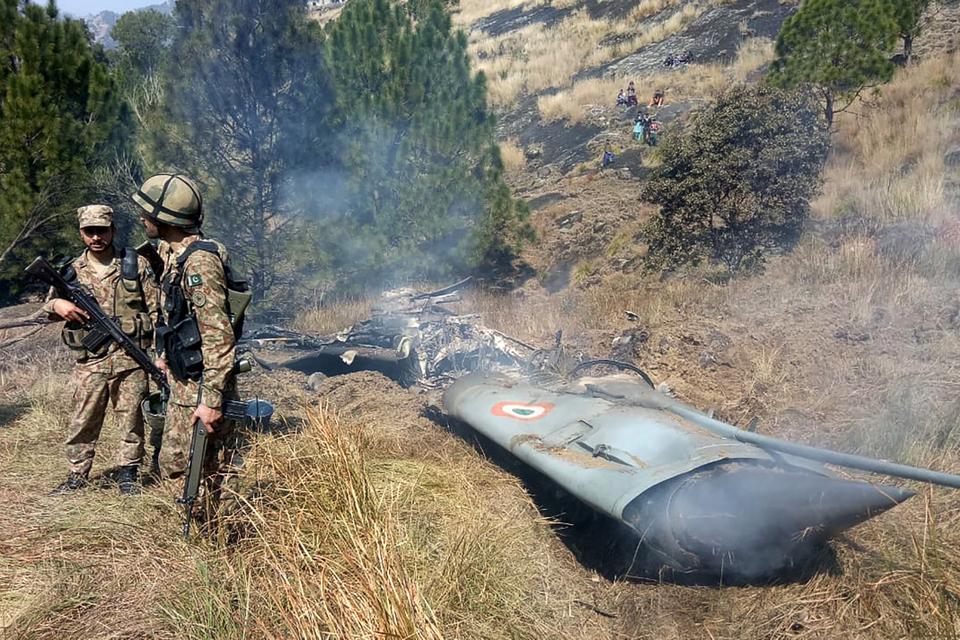Fri 10 May 2019:
Prime Minister Narendra Modi is seeking to boost the popularity of the Bharatiya Janata Party by harping on national security issues and decades-old disputes with nuclear rival Pakistan. Will it help the party earn electoral dividends?
Uttar Pradesh, India –– A gathering of distressed farmers and supporters of India’s ruling Bharatiya Janata Party (BJP) got into a heated argument on a recent April afternoon in Kakda, a dusty village in northern Uttar Pradesh state.
The farmers accused the BJP sympathisers of painting a false image of Prime Minister Narendra Modi and deceiving the public.
One farmer Vinod Kumar told TRT World that Modi’s newly adopted moniker ‘chowkidar’, which means watchman for the nation, was completely out of step with reality.
“He’s the watchman in name only,” Kumar, the sugarcane grower, said. “It’s the poor farmer who has been made to guard his fields against stray cows.”
But 25-year-old Modi supporter Arnav Ballian admires the leader for his muscular foreign policy. “Whether it’s Pakistan or China, no one has the guts to look towards India with an evil eye. The national security is as important as other issues,” he said.
With the last two parts of the seven-phase election underway, the contest in the world’s largest democracy has gotten tighter. The growing resentment in the countryside over a weak economy, job losses among daily-wagers and stray cattle destroying the wheat and cane fields complicates the BJP’s good economy and rapid development rhetoric.
Many villagers TRT World spoke to said the ruling party has instead sharpened its focus on building maximum security in light of its rivalry with Pakistan and the unresolved Kashmir dispute.
“Villagers are divided,” Rajbir Singh, a 65-year-old village head, told TRT World.
Singh said many among the village folk were either voting for the gathbandan, an alliance between regional parties, or the ruling BJP.
“There is no Modi wave like 2014. It’s now been replaced by a wave of national security,” he said.

Kashmir attacks boosts Modi’s popularity
Over the last few months, support for Modi’s Hindu nationalist party appears to be growing following a spike in tension with Pakistan, especially after a Kashmiri suicide bomber killed at least 40 Indian soldiers in India-administered Kashmir’s Pulwama district on February 14.
Modi ordered airstrikes on what he described as a training camp of a proscribed militant group, Jaish-e-Mohammad, in Pakistan’s northern Balakot area. The move backfired as the fighter jets reportedly missed the intended target, ratcheting up tensions in the region.
In turn, Pakistan launched airstrikes in India-administered Kashmir the next day, shooting down two Indian planes in an aerial dogfight, and captured Indian pilot Abhinandan Varthaman. India says only one of its jets was downed, however.
As a ‘goodwill’ gesture, Pakistan released the pilot later.
Since then Modi and other BJP leaders keep invoking the Balakot strikes and Pakistan in election campaigns, with the opposition Congress filing objections to the country’s election board asking it to prevent Modi from using the Indian armed forces as a smokescreen to garner votes.
In one rally Modi, quoting an unnamed US official, said the Indian pilot was released because “Modi was ready with 12 missiles”. In another campaign rally, he asked people to remember the Balakot airstrikes in which “terrorists were killed at their home” and urged them to vote for his party which was killing “terrorists” and protecting the nation.
Modi has also sought to politicise the country’s army, marketing its operations in disputed Kashmir for BJP’s political gain in the elections.
In eastern Aurangabad city, Modi made an emotional appeal to first-time voters at a rally, urging people to dedicate their vote to Indian airstrikes on Pakistan and to the Indian soldiers killed in the Kashmir suicide bombing, much to the chagrin of opposition parties.

“We don’t yet know whether these international factors will help the BJP. What we do know is that the BJP is campaigning extremely hard on foreign policy and international relations themes that are usually much less central to Indian elections,” Paul Staniland, a South Asia expert at the University of Chicago, told TRT World.
“At minimum, these topics seem to have invigorated the BJP party machinery, which indirectly helps the campaign; at maximum, they may have staved off defections by voters who otherwise are not impressed with the government.”
BJP leaders have been found avoiding a debate on Modi’s policy missteps, such as demonetising banknotes and his failure to fix the sluggish economy, growing unemployment, which is at its highest level in 45 years, the stray cattle menace, communal tensions and the farm crisis.
But it has not stopped many from comparing Modi to then prime minister and Congress strongman Indira Gandhi, who ruled India during 1971 war with Pakistan, which resulted in the creation of Bangladesh from what was then East Pakistan.
“As per popular perception Modi is a strongman after Indira Gandhi,” Jayanta Ghoshal, Political Editor at the Hindi language news channel India TV, told TRT World.
“The attack on Pakistan has an impact on domestic scenario. The surgical strikes have created a milieu, especially in north India, that Modi can combat soft-aggression,” he said.
But he added: “Modi isn’t averse to dialogue. There could be a peace process [between Pakistan and India] after elections are over.”
Prime Minister Narendra Modi in Kurukshetra, Haryana: When India entered Pakistan and killed the terrorists, one of our brave sons was captured by Pakistan, they had to release him within 48 hours, they came to see him off at Wagah border. pic.twitter.com/EdhlD08yKb
— ANI (@ANI) May 8, 2019
Changing of goal posts
In the 2014 general elections, the BJP fought in the name of ending corruption and ensuring development across India. It also encouraged Hindu voters by promising them a Ram temple on the ruins of the 16th-century Babri mosque, demolished by Hindu zealots in December 1992.
But in this election, the BJP appeared to have softened its stand and only covertly backed its hardline Hindu allies in demanding the construction of the temple.
“Since BJP is ruling, it doesn’t make sense for the party to ask for votes on the name of temple construction, again,” a BJP observer based in New Delhi told TRT World, on the condition of anonymity.
Just ahead of the elections, the BJP organised the world’s largest Hindu religious gathering, the Kumbh Mela, reportedly spending some $586.8 million on the religious gathering in Uttar Pradesh.
“The event usually takes place after a gap of 12 years. The last such gathering in Uttar Pradesh was held in 2013 and the next one is slated for 2025. But BJP timed it around elections only to seek political benefits,” said the observer.
The Pulwama attacks and the subsequent airstrikes, he said, couldn’t have come at a better time for the ruling party.
“Compare it with Sri Lankan bombing. The defence minister quit. The police chief was replaced, But, in India, the blame was shifted on Pakistan. And the compliant media refused to seek accountability from the government,” he said.
Critics have slammed the BJP and Indian media for not revealing the nature of the intelligence failure leading to the killing of over three dozen paramilitary troopers and pushing Pakistan and India to the brink of nuclear war.
“The issue is people are talking about the security lapse but the India government isn’t revealing what exactly was the nature of the lapse,” Suchitra Vijayan, a US-based political analyst and the founding director of Project Polis, a research and journalism organisation, told TRT World.
“Kashmir is a security state with vast surveillance. Who leaked the information about the passing of military convoy? Why was the bomber detained previously? These questions have not been answered.”
Militant leader Masood Azhar’s blacklisting
“How BJP translates all this into votes will be seen on May 23 when the results are announced,” Pravin Sawhney, a New Delhi-based defence expert and editor of FORCE magazine, which focuses on Indian national security and defence, told TRT World.
“BJP has made national security, using 2016 surgical strikes and now Balakot strikes as key narrative. They simply want to take the attention away from the anger over demonetisation, GST [India’s biggest indirect tax reform in the form of Goods and Services Tax], and other issues.”
With the United Nations Security Council adding Masood Azhar, Founder of Jaish-e-Mohammad, to the Daesh and Al Qaeda blacklist, which comes with a travel ban and a freeze on his assets, it has given BJP another shot in the arm.
Immediately after the UN announcement, Modi attacked the opposition Congress saying the party was “sulking” because the development took place during BJP’s rule. Congress had expressed disappointment over the UN sanctions linking Azhar to Daesh and Al Qaeda and not to the Kashmir suicide attack.
“Congress is sulking because they think how the Chaiwala [tea-seller, another moniker Modi often uses to describe his ordinary background] can do what they could not do then,” the Indian prime minister said.
Modi urged people to hand over a piece of cloth to crying Congress leaders “when they come to seek votes”, and dubbed Azhar’s listing by the UN as a “third surgical strike” against Pakistan, after the so-called 2016 “surgical strikes” and 2019 Balakot strikes.
“I’ve no issues if BJP takes credit for the blacklisting of Masood Azhar because the government has been following this case for the last two years, rigorously. My worry is BJP is turning a minor issue into a big achievement as if it will end terrorism in India,” Sawhney said. “It’s just a BJP sideshow.”
Source: TRT World






